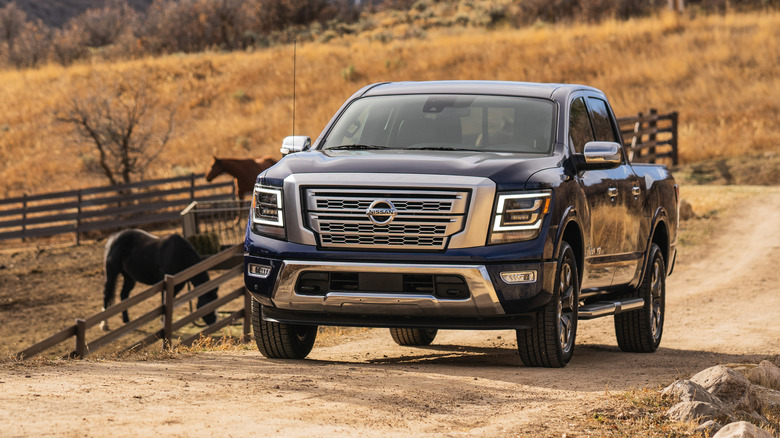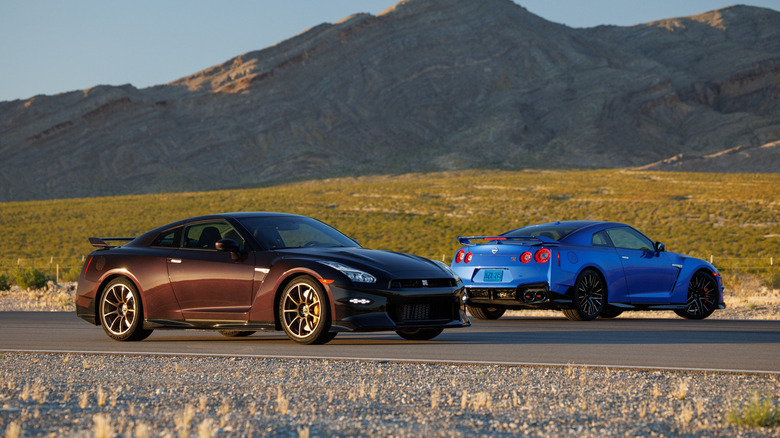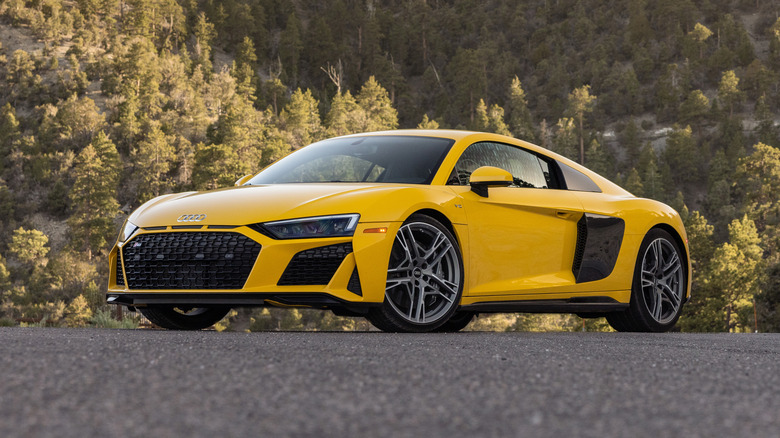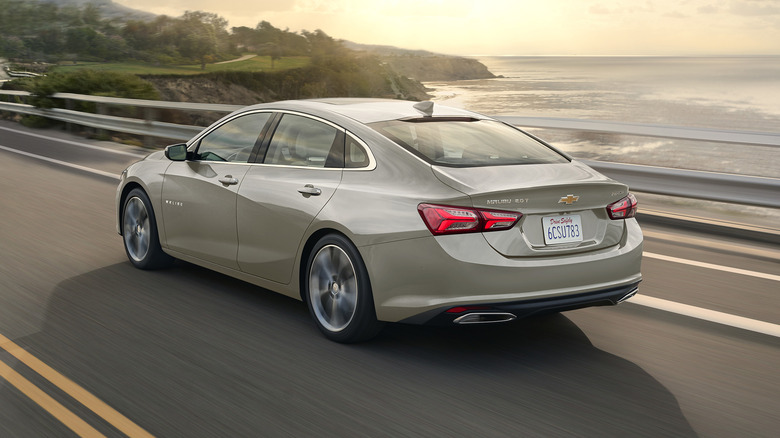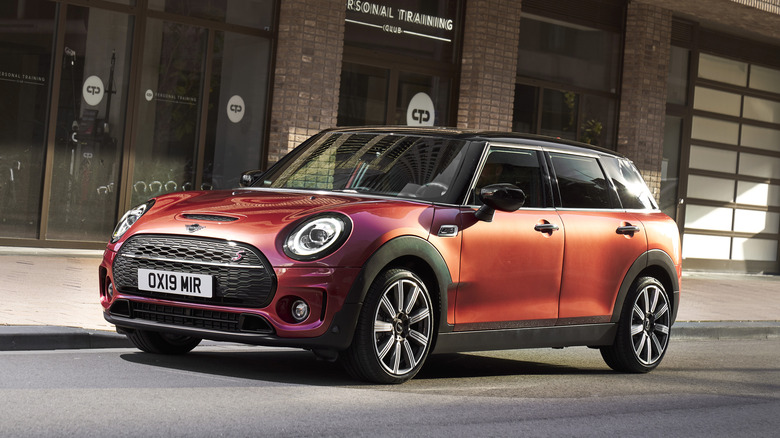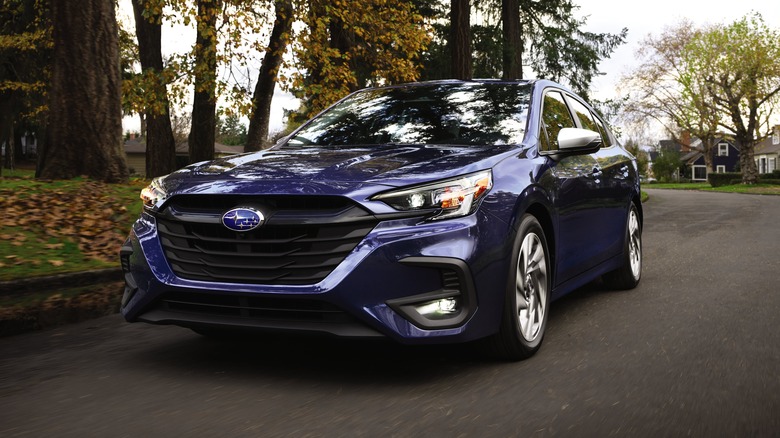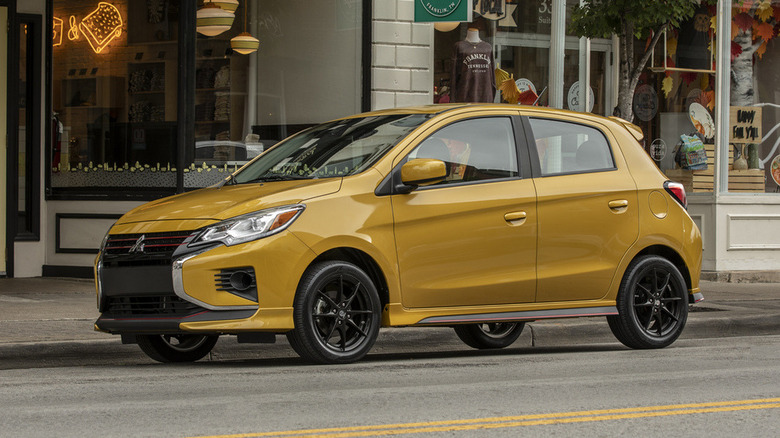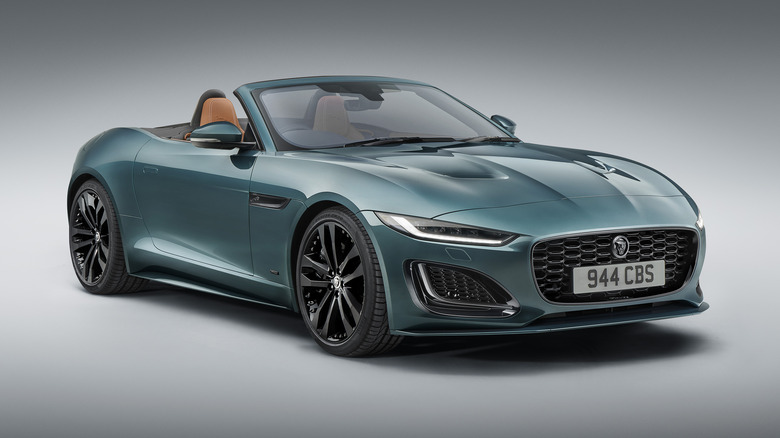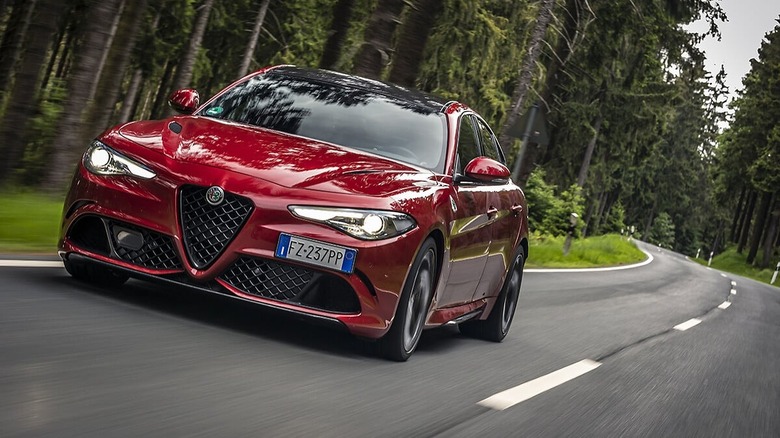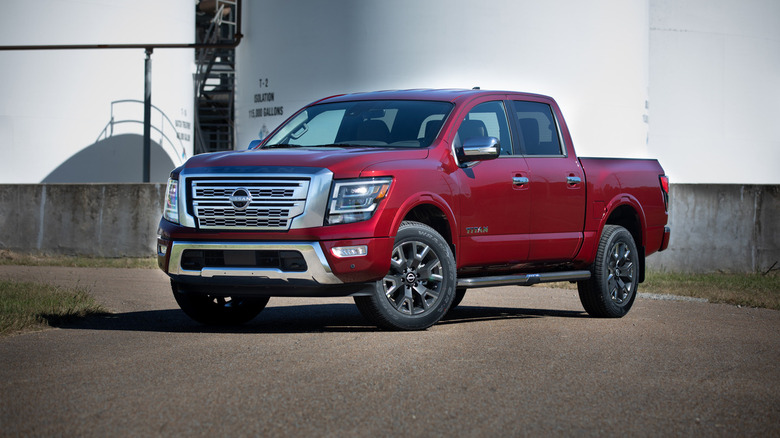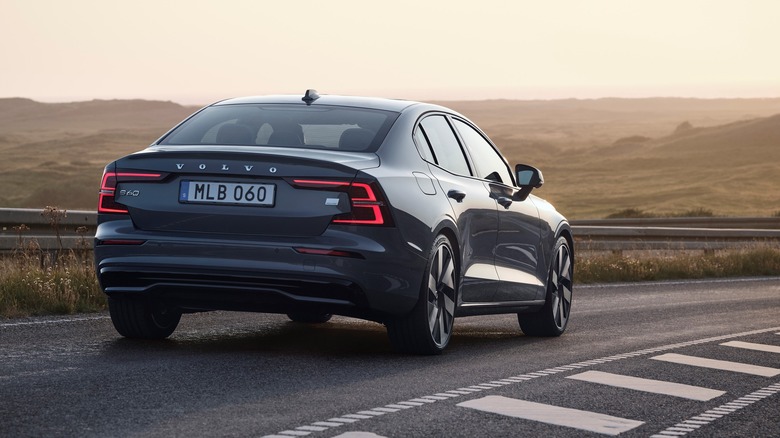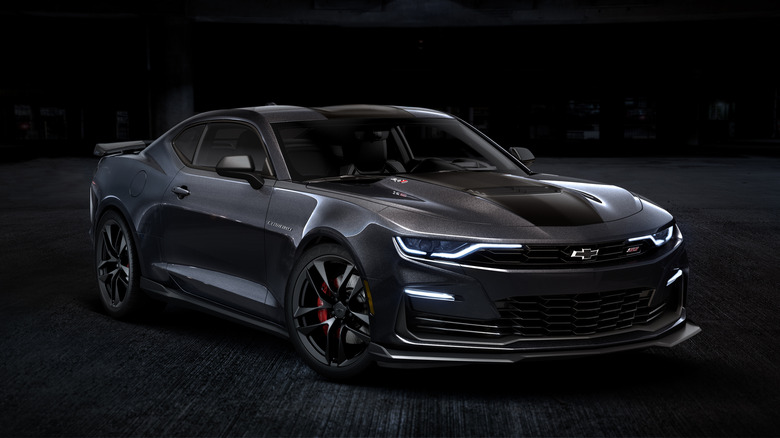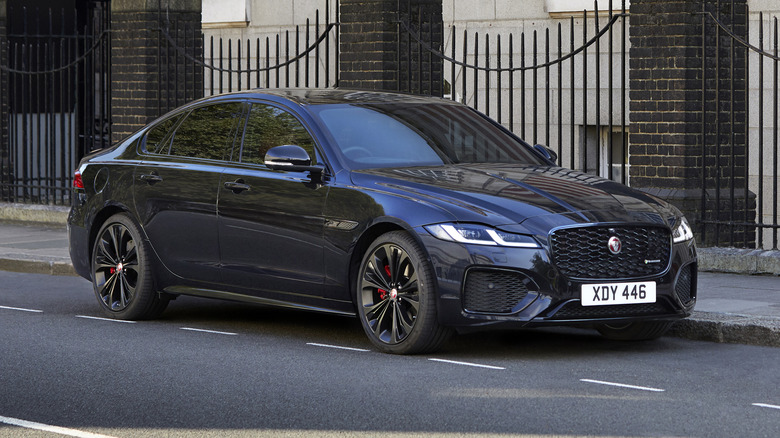12 Top Brand Cars And Trucks Being Discontinued In 2025
The auto industry is in the midst of a rapid transformation, with most major carmakers throwing their weight behind EVs to some degree. Some are opting to play it safe, adding EV models alongside gas-powered cars, and some are boldly aiming to be EV-only in just a few years. Only time will tell which strategy proves most successful, but either way, there's only so much room in each brand's lineup. That means that some existing cars have to be discontinued to make way for the upcoming electric models.
Last year saw a number of high profile cars axed, and this year, an even bigger set of names is set to be struck from dealer order lists. It's a particularly bad year for sports car enthusiasts, with several fan favorites reaching the end of their lifespan, but everything from budget-friendly econoboxes to full-size pickup trucks are also being phased out. These cars and trucks aren't an exhaustive list of every model being axed after 2024, and there's a chance that even more discontinuations might be announced before the year ends. For now though, these are the most high profile models that are confirmed to be discontinued for 2025.
Nissan GT-R
While it's always sad to see production of a halo car like the Nissan GT-R come to an end, it's arguably the right time for it to go. The R35 generation first debuted back in 2009 and has not changed significantly in the decade and a half since. It's no longer the cut-price supercar killer it once was, although its performance is still impressive even after all these years. It's being sent off with two special edition variants, one of which is the GT-R Skyline Edition, complete with the R34 GT-R's famous Bayside Blue paint. Speculation has inevitably turned to the introduction of an R36 generation, but for now, Nissan has yet to make an official statement on the future of the nameplate.
It seems likely that a successor will eventually emerge, although whether it is powered by gas or electricity remains to be seen. If it's the latter, it's likely that a new generation won't emerge for another few years, to allow for the development of next-gen battery technology. It's also possible that a hybrid GT-R might be on the cards, potentially with an electrically-assisted version of the VR38 V6 found in the R35.
For now, though, the rumors count for nothing. Nissan hasn't even confirmed that it will replace the R35 with a direct successor, and so when production of the current generation ends in October 2024, there's a chance that it will be the last Nissan halo car of its kind.
Audi R8
The Audi R8 has seemingly been facing the chop for years — in fact, it appeared in last year's edition of this list as it was originally set to be discontinued after the 2023 model year. The news of its discontinuation was first confirmed at the end of 2022, but it seems it took the threat of losing the car for collectors to realize what they were missing out on. In the wake of the discontinuation announcement, sales of the R8 shot up so much that it was given a stay of execution. Audi kept the car in production until March 2024 to accommodate for the extra demand.
Production has now ended, however, and there isn't a replacement for the car in sight. There have, of course, been plenty of rumors over the years, with some reports that an electric successor was in the works. However, when asked by Car and Driver about the reports, an Audi spokesperson denied such a car was in development. For now then, it remains unclear if, or when, a successor will arrive.
Chevrolet Malibu
GM's habit of giving its cars model years that don't match up to their production dates means that the Chevy Malibu sedan will receive a 2025 model year, even though production is set to end in November 2024. The car is currently being built alongside the Cadillac XT4 crossover in GM's plant in Kansas City, Kansas. After the Malibu is discontinued, XT4 production is set to be paused while the plant is retooled to allow for production of a new Chevy EV. Production of the Caddy will eventually restart, but there is no plan to resurrect the Malibu.
SlashGear has previously argued that the Malibu is a good car with one fatal flaw: it's never managed to get anyone to pay attention to it. In the face of ever-rising demand for crossovers and SUVs, the humble sedan was already at a disadvantage. Yet, even when rival sedans from other manufacturers managed to hold on to some market share, the Malibu simply couldn't interest enough buyers. That alone was enough to spell the end for one of Chevy's longest-running nameplates.
Mini Clubman
As automakers continue to roll out a wider range of electric models across their lineups, some existing models inevitably face the chop as a result. The Mini Clubman is one such victim of the switch to EVs, being discontinued after the 2024 model year and replaced with the Aceman, an all-electric crossover. The Clubman has been in production since 2007 at the Mini plant in Oxford, England, and after production ends, the plant will be retooled to build the new Aceman.
The Clubman never managed to build the same fanbase as the Mini hatchback, even though its horizontally-opening split rear doors make it just as quirky as the original Mini variant. Its more upright proportions and added interior space might have made the Clubman a more practical daily driver than the hatchback, but it was still small and cramped compared to many other similarly priced rivals. The new Aceman doesn't deviate from the formula too much, although its revised design looks more like a larger Mini hatchback than a shrunken Mini wagon. Perhaps that will be enough to get buyers excited this time around.
Subaru Legacy
The Chevrolet Malibu isn't the only long-running sedan set to face the ax in 2025. Subaru has also announced that it's discontinuing its Legacy sedan after the 2025 model year, with production ending early in 2025. Affordable sedans like the Legacy have lost considerable ground in the market in recent years against the onslaught of crossovers and SUVs, and as a result, they're disappearing from dealerships. Subaru also cites its transition to electric vehicles as a reason for the Legacy's discontinuation, noting that it's due to offer eight different electric vehicles in its lineup by 2028.
Whether any of them will be as cheaply priced as the Legacy remains to be seen. The car starts at just under $25,000, one of very few sedans of its size at that price point. Prices for EV batteries are in steep decline, with a report by Goldman Sachs estimating that they're likely to fall by as much as 40% between 2023 and 2025. Whether that reduced cost is passed down to consumers remains to be seen. For now, there's no confirmation that the Legacy will get a direct EV successor at all, as Subaru has not yet announced details about the majority of its upcoming EV lineup.
Mitsubishi Mirage
In a market where most automakers were giving even their cheapest cars higher equipment levels, more powerful engines, and advanced technology, the Mitsubishi Mirage stood out. It was most recently refreshed in 2021 and featured a modest 1.2L engine churning out just 78 horsepower. Its interior upholstery was basic, as was its infotainment system. You could argue — and many journalists did – that the Mirage was, as a result, a bad car. However, it was also just about the cheapest car on the market. That alone made it worth something to buyers who wanted a new car but couldn't stretch their budget to anything pricier.
While Mitsubishi hasn't officially announced that it's discontinuing the Mirage, it's been widely reported that the car will be kicked from the automaker's lineup after 2025. Most likely, Mitsubishi will eventually claim its demise was down to a mix of emissions regulations, shifting consumer tastes, or upcoming EV launches. Maybe a mix of all three. That might well be true, but it's still a shame that another of the most affordable cars on the market is set to bite the dust.
Jaguar F-Type
With Jaguar's lineup set to undergo a radical overhaul in 2025, the brand's current cars are being mostly retired in preparation for its new look. Having been in production since 2013 with only one facelift during that time, the F-Type was nearing the end of its lifespan anyway, and so it should be no surprise that it's being discontinued after 2024. Jaguar has said that the last remaining models should be available in dealerships until early 2025, at which point it's clearing the decks for its new wave of all-electric luxury cars.
The end of F-Type production is being commemorated by a limited-run special edition, the F-Type ZP, which features unique color combinations, special badging, and an individually numbered plaque. Only 150 models are set to be built, each with the top-spec F-Type's 575 horsepower V8 engine. No direct successor has been announced as of this writing, with Jaguar instead reportedly focussing its efforts on an all-new, four-door grand touring EV that's set to debut in 2025.
Alfa Romeo Giulia Quadrifoglio
With its parent company Stellantis being one of the biggest advocates for electrification, it was inevitable that Alfa Romeo's Ferrari-derived 500 horsepower V6 engine was on borrowed time. In early 2024, a representative for the brand confirmed that both cars featuring the engine, the Giulia Quadrifoglio and Stelvio Quadrifoglio, would be discontinued in mid-2024. The Giulia is a particular shame, as performance sedans are already a dying breed, and the some of the few that do remain are also tipped for the chopping block soon.
The brand's spokesperson confirmed that the Giulia QV and Stelvio QV were the last combustion-engined cars to wear the four-leaf clover badge, but suggested that a hybrid or electric successor might eventually appear. For now, there's no word on when that might happen, or which Alfa Romeo models will be subject to the QV treatment. Electric successors to both the Giulia and Stelvio are reportedly set to appear within the next two years, so there's a chance that QV versions of both will be available.
Nissan Titan
While the pickup truck segment overall is in rude health, the Nissan Titan's sales figures don't look so rosy. According to figures collated by TFLTruck, the Titan was by far the least popular combustion-engined full-size truck in Q1 2024, selling just over 4,100 units. That's behind the electric Ford F-150 Lightning, which sold just over 7,700 units, and way behind its nearest gas-engined competitor, the Toyota Tundra, which shifted more than 36,000 units. With those kinds of numbers, it should be no surprise that the Titan is being discontinued after summer 2024.
The plant that currently produces the truck in Canton, Mississippi will be retooled to produce two electric sedans. One is set to come with Nissan branding, while the other will reportedly be an Infiniti. Nissan isn't completely abandoning the pickup market, with the Frontier remaining in its lineup for now. There has been no indication that Nissan plans to replace the Titan with a successor, although if one does arrive, it may well be electric. If it is, it likely won't appear until at least 2028, which is when Nissan expects to launch its next-gen battery technology.
Volvo S60
SlashGear was impressed with the plug-in hybrid Volvo S60 after spending some time with it earlier in 2024, since it offered a middle ground for buyers who weren't willing to make the leap to a fully electric vehicle. Its electric-only range was better than most rivals, and enough that most grocery or school runs could be completed without needing to engage the combustion engine. However, despite its eco-conscious appeal, the car has failed to find much traction with buyers, and so is being discontinued after 2024.
In its place, Volvo has launched the EX30 electric crossover, with production already underway at the brand's South Carolina facility since June 2024. It seems that buyers can't get enough of crossovers, but it remains to be seen whether the EX30 will strike a chord with buyers. Either way, it seems unlikely that a direct successor to the S60 will arrive anytime soon, as Volvo focuses its efforts on more lucrative segments of the market.
Chevrolet Camaro
One of the most high profile discontinuations of the year, production of the sixth-generation Chevrolet Camaro came to an end at the start of 2024. There has been a huge amount of speculation about what might replace it, with very little in the way of official information available to satisfy enthusiasts. At the time the discontinuation announcement was made, Chevy's vice president said, "while we are not announcing an immediate successor today, rest assured, this is not the end of Camaro's story." Since then, a few further details have emerged.
In an interview with MotorTrend in May 2024, GM President Mark Reuss suggested that the Camaro could return as an affordable enthusiast car, although stopped short of confirming whether it would be a car or a crossover. The outlet suggested that, based on Reuss' comments, the new Camaro wouldn't be a two-door muscle car even if it avoided getting the crossover treatment. Instead, it would likely have four doors to entice a wider range of buyers. So, although it's highly likely that the Camaro nameplate will return in the future, the days of the two-door, high-powered Chevy coupe seemingly ended with the discontinuation of the current generation.
Jaguar XF
The XF sedan alongside the smaller XE have both been discontinued for 2024 as Jaguar's brand reinvention kicks into gear. It aims to rebrand itself as a low-volume, high-end luxury marque from 2025, and that means all of its entry- and mid-level models are being removed from the lineup. The XF and XE sedans have been at the back of the brand's priority list for several years now, with their production being temporarily halted in 2020 due to issues with parts supply. Prioritization for the limited supply of parts available was given to more in-demand models, and although production did eventually resume, it's not like either car has been flying out of dealerships in the years since.
Jaguar plans to launch a high-end grand tourer for 2025, followed by a flagship luxury SUV and an executive sedan. All of those will be electric — the brand is set to be EV-only from 2025 onwards — and there are no plans for a more affordable model in the near future. That means the XF and XE may never receive a direct successor, at least if Jaguar's bold plans to transform itself are as successful as bosses are hoping.
